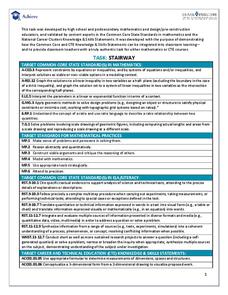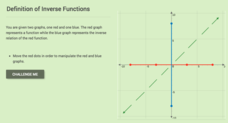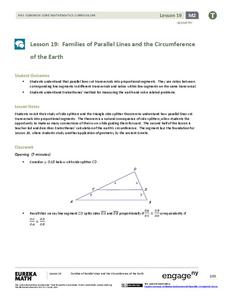Curated OER
In the Right Order
What comes first? Practice order of events with this sequencing activity. Learners examine two sets of pictures and write 1st, 2nd, and 3rd beneath the corresponding pictures. Encourage them to explain their reasoning, as there may be...
Teacher Treasures
Class Credit Cards
Give children credit where credit is due with this classroom management system. Providing each student with their very own charge card, they are able to gain credit for being respectful and responsible and can spend their earnings on...
Achieve
Stairway
It's the stairway to learning! Scholars research all aspects of building a staircase. Using information from building codes, they write and graph a system of inequalities to analyze the constraints. The completed project is a scale model...
Achieve
Rabbit Food
Keep your pets slim, trim, and healthy using mathematics! Pupils use a linear programming model to optimize the amount and type of food to provide to a pet rabbit. They model constraints by graphing inequalities and use them to analyze a...
Virginia Department of Education
Similar Triangles
Pupils work in pairs to investigate what it takes to prove that two triangles are similar. They work through various shortcuts to find which are enough to show a similarity relationship between the triangles. Small groups work with the...
CK-12 Foundation
Definition of Inverse Functions
Investigate the definition of inverse functions graphically. Using the interactive, scholars create a graph of a function and view its resulting inverse. They then determine whether a group of functions have inverses that are also...
Curated OER
Flicking Football Fun
Young mathematicians fold and flick their way to a deeper understanding of statistics with a fun, hands-on math unit. Over the course of four lessons, students use paper footballs to generate data as they learn how to create line...
Oklahoma State Department of Education
Narrative Prompt
Reading about history is nothing like experiencing it firsthand. Encourage your eighth graders to do the next best thing with a historical narrative prompt, in which they describe the experience of a first-time traveler on the...
media.yurisnight.net
Science Lesson Plan: Our Solar System: I Wonder?
Ever wonder why Pluto isn't considered a planet? Or how large the Earth is compared to the other inner planets? Explore the universe with a series of projects that simulate different aspects of our solar system. The activities require...
It's About Time
Detect and Induce Currents
Young scientists recreate an 1820 experiment and build off of it to investigate how to detect and induce electrical currents. As a final activity, scholars answer questions in multiple formats.
EngageNY
Solving Area Problems Using Scale Drawings
Calculate the areas of scale drawings until a more efficient method emerges. Pupils find the relationship between the scale factor of a scale drawing and the scale of the areas. They determine the scale of the areas is the square of the...
EngageNY
Comparison Shopping—Unit Price and Related Measurement Conversions
Speed up your scholars' understanding of ratios. Class members compare ratios related with speeds presented in different representations. They then use the unit rates to make the comparisons.
EngageNY
The Structure of Ratio Tables—Additive and Multiplicative
Build tables by understanding their structure. Scholars take a closer look at the structure of ratio tables in the 10th segment in a 29-part series. Individuals realize that the tables can be built using an additive or multiplicative...
Federal Reserve Bank
History of Money and Banking in the U.S.
Why was there a lack of confidence in the money and banking system of the early United States government? What historical events led to the establishment of the Federal Reserve System? Here you'll find reading materials and worksheets to...
Houghton Mifflin Harcourt
Unit 4 Math Vocabulary Cards (Grade 2)
Enhance math vocabulary instruction with a set of flash cards. The set displays words with bold font and corresponding picture cards with labels. Terms include estimate, regroup, round, add, and sum.
EngageNY
Families of Parallel Lines and the Circumference of the Earth
How do you fit a tape measure around the Earth? No need if you know a little geometry! Pupils begin by extending their understanding of the Side Splitter Theorem to a transversal cut by parallel lines. Once they identify the proportional...
Virginia Department of Education
Properties of Quadrilaterals
What type of quadrilateral is that? Discover the difference between the types of quadrilaterals. Small groups investigate types of quadrilaterals using geometry software to find their properties. To keep track of the different...
ReadWriteThink
Word Recognition Strategies Using Nursery Rhymes
As a class, scholars read the poems, Humpty Dumpty, Peter, Peter, Pumpkin Eater, and Jack and Jill, in order to identify words with the same ending sound. Using their rhyming skills, learners brainstorm additional words from word...
Curated OER
Match the Rhymes
Focus on the short u sound in this rhyme worksheet for emergent readers. Learners examine images surrounding a jug, drawing lines to connect it to those that rhyme (bug, rug, mug). Then, they practice their printing by tracing the...
Curated OER
Birds' Eggs
More than just data, scatter plots are full of information that can be used to answer a variety of questions. This lesson uses a plot with information about bird egg sizes to answer questions about the relationship between length and...
Teacher Writing Center
Thanksgiving Lesson
Practice using proper verb tenses in the spirit of Thanksgiving! Learners are given holiday photographs as prompts to create oral and written sentences in a targeted verb tense.
Curriculum Corner
Winter Multiplication and Division Problem Solving Task Cards
A set of 18 winter-themed multiplication and division word problems is perfect for your math centers right before the holidays. Each problem is numbered and represented on a task card. Young mathematicians write their answers on a...
Arcademics
Minus Mission
A learning game tests scholars' subtraction skills. While playing, participants use a canon to subtract the slime away by choosing the correct equations that correspond with the number shown.
Flipped Math
More with Proofs
Proofs may be as easy as 1, 2, 3 ... maybe. Pupils participate in creating four example proofs. The presentation uses a list of geometric properties to develop the proofs by filling in both the statements and reasons. Scholars practice...

























